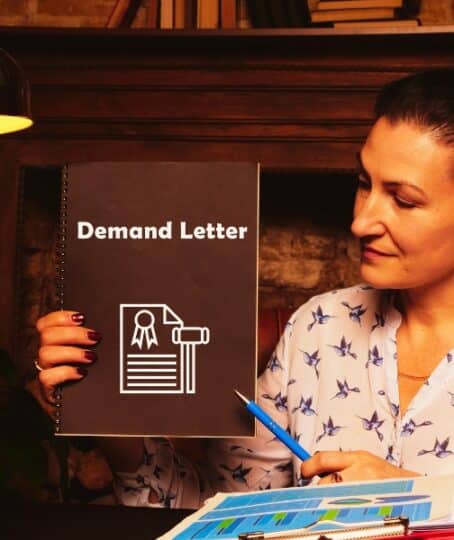
Who Is Liable for Parking Lot Slip and Fall Injuries in Illinois? Determining liability for injuries in a parking lot...


You’ve been injured. Someone else caused it. Now you need to know what really happens when you sue—no sugar-coating, no legal jargon that leaves you confused.
When I tell my clients, “if we can’t settle this case, we’re going to trial,” they deserve to know what that really means. So let me break down the five critical steps in a personal injury case, from the moment we send that first demand letter to the moment a jury renders their verdict.

The personal injury lawsuit process doesn't start until you've reached a critical point in your medical treatment. You're either done with treatment entirely, or your doctors have laid out a clear prognosis for future care. That's when we strike.
Every personal injury case follows a predictable path, but the outcome depends entirely on how aggressively your attorney fights at each stage, and how willing the other side is to pay you fair compensation.
Once your medical treatment is complete (or we have a definitive future treatment plan), we prepare and submit a comprehensive settlement demand package to the defendant's insurance company.
If liability is clear, meaning it's obvious their insured caused your injuries, the insurance company will typically respond with an offer.
Will that offer be fair? Almost never on the first attempt.
Insurance companies are in the business of minimizing payouts. They'll lowball you. They'll hope you're desperate enough to take whatever they throw at you. This is where having an experienced personal injury attorney on your side becomes critical.
After the initial demand and their inadequate offer, we enter negotiations. This isn't a polite back-and-forth. This is a calculated legal chess match where every move matters.
Negotiation tactics may include:
Sometimes negotiations succeed. The insurance company realizes they're facing a strong case with a lawyer who won't back down, and they offer reasonable compensation.
Sometimes, negotiations fail. The insurance company refuses to offer fair value for your suffering, your medical bills, your lost wages, your permanent injuries.
When that happens, we file a lawsuit; not because we want to drag things out, but because it's the only way to force them to pay what your case is worth.
Once we file your complaint and the defendant answers it, we enter the discovery phase. This is where both sides gather evidence, and it starts with written discovery.
Interrogatories: These are written questions each side must answer under oath. We'll ask the defendant to explain exactly what happened, identify witnesses, describe any prior incidents, and provide detailed information about their version of events.
Requests for Production of Documents: We demand relevant documents like incident reports, surveillance footage, maintenance records, employment files, and insurance policies. We look for anything that proves your case or undermines their defense.
Requests to Admit: These are strategic questions that force the defendant to admit or deny specific facts. If they deny something obviously true, it makes them look evasive and damages their credibility before trial.
Written discovery is tedious, detailed work, but it's absolutely essential. The information we extract during this phase plays a role in whether we'll win at trial.
After written discovery comes oral discovery, or “depositions”. This is where things get real.
What is a deposition? A deposition is sworn testimony taken outside of court but under oath, recorded by a court reporter. Anything said in a deposition can be used at trial.
In Illinois, discovery depositions are limited to three hours per person. That might sound like a lot, but when you're questioning a defendant who caused a catastrophic injury, three hours flies by.
First, we lock witnesses into their story. They can't change their testimony later at trial without us impeaching them with their deposition transcript.
Second, we evaluate how witnesses will perform in front of a jury. A defendant who comes across as arrogant or evasive in deposition will likely do the same at trial. Juries punish that.
Third, we take evidence depositions of expert witnesses whose live trial testimony would be prohibitively expensive. Rather than paying a surgeon $5,000 to sit in court all day waiting to testify, we depose them on video and play that testimony for the jury.
If we still can't resolve your case through settlement (and sometimes defendants refuse to be reasonable even when facing overwhelming evidence), we’ll go to trial.
Jury Selection (Voir Dire): We question potential jurors to identify biases and select people who will fairly evaluate your case.
Opening Statements: I tell the jury what happened to you, what we'll prove, and why the defendant must be held accountable.
Presentation of Evidence: We call witnesses, introduce medical records and bills, show photographs and videos, and present expert testimony proving liability and damages.
Cross-Examination: I question the defendant and their witnesses, exposing weaknesses in their story and inconsistencies in their testimony.
Closing Arguments: This is where I connect all the evidence, remind the jury of the defendant's negligence, and argue for the compensation you deserve.
Jury Deliberation and Verdict: The judge instructs the jury on the law, and they deliberate privately to reach a verdict.
Here's what you must understand: Once your case goes to a jury trial, the outcome is in the jury's hands.
The jury determines fault. The jury determines damages. While I'll argue passionately for a specific award that compensates you for every penny of medical bills, every dollar of lost wages, every moment of pain and suffering, the jury isn't bound by my recommendations.
They can award more than I request. They can award less. They have complete discretion.
That's why jury selection and trial presentation are so critical. Every decision we make, from which witnesses to call to how we frame the evidence, affects whether you get justice.
It depends. A straightforward case with clear liability and reasonable insurance adjusters might settle within 6–12 months after you've completed treatment. A complex case involving disputed liability, severe injuries, or an insurance company that refuses to negotiate in good faith could take 2–3 years from filing the lawsuit to trial verdict.
Here's my promise to you: I will not advise you to settle for less than your case is worth just to close the file faster. If going to trial means you get the compensation you deserve, we're going to trial.
Understanding these five steps in the personal injury claim process isn't just about satisfying curiosity. It's about empowering you to make informed decisions about your case.
When you know what to expect at each stage, you can:
The personal injury lawsuit process is designed to uncover the truth, hold wrongdoers accountable, and compensate injured victims. But the system only works when you have an attorney who knows how to leverage each stage to build the strongest possible case.
If you've been injured in Bloomington, Peoria, Chicago, or anywhere in Illinois due to someone else's negligence, you don't have to navigate this process alone.
As an Illinois personal injury attorney with over 25 years of experience handling cases from initial demand through jury verdict, I know what it takes to maximize your recovery.

Who Is Liable for Parking Lot Slip and Fall Injuries in Illinois? Determining liability for injuries in a parking lot...

When Is a Property Owner Liable for Poor Lighting Accidents in Illinois? Property owners owe a duty of care to...

How Early Representation Protects Your Case Obtaining an attorney at the beginning of the process allows your lawyer to handle...